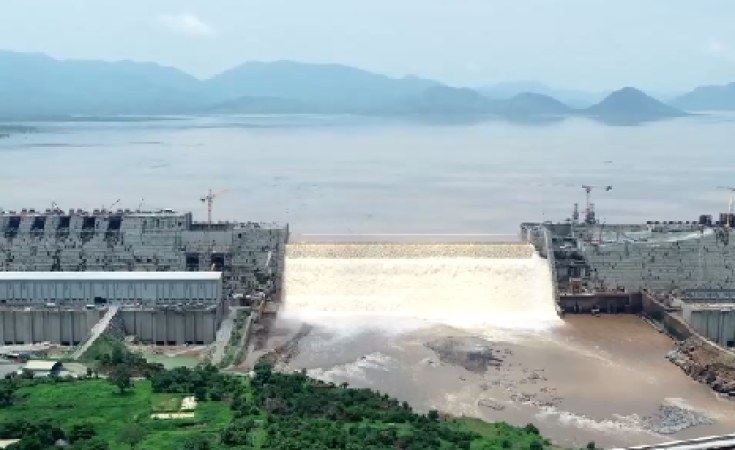The latest round of talks since December 2022 between Egypt, Sudan and Ethiopia over the Grand Ethiopian Renaissance Dam (GERD) held in Cairo ended at the beginning of this week without a resolution. The tone of the statements issued by the countries after the negotiations ended in the usual impasse came as no surprise to watchers. Egypt was clearly dismayed by the stalemate, accusing Ethiopia of not demonstrating a tangible change in its positions.
Ethiopia, meanwhile, said the parties exchanged views to reach a win-win situation during the negotiations. Although the resumption of talks after an almost two-year hiatus, which came about following an agreement Ethiopian and Egyptian leaders reached in mid-July to initiate expedited negotiations to finalize an agreement, was welcomed by all sides, realistically there was no hope that a breakthrough would be reached from the get go. As Ethiopia looks to find an amicable and long-lasting solution to a long-running dispute that has had it at loggerheads with the lower Nile riparian countries and western powers, it's incumbent on it to adopt positions that benefit the interests of all negotiating parties.
From the day Ethiopia announced plans to build the GERD thirteen years ago, Egypt has been openly opposed to the project. The authorities and media outlets of Egypt have consistently characterized the made use of the GERD as a half-baked project that harms the interests of Egypt and its people. For centuries Egyptian rulers have tried to use every tool at their disposal, including harassment and occasionally launching invasions against Ethiopia to "protect" the country's interest in the Nile. Though Egypt has portrayed itself as having a stake in engaging in genuine negotiations over the GERD, it has repeatedly declined to sign up to the River Nile Cooperative Framework Agreement--an internationally accepted pact which nullifies colonial-era treaties on the river-- that six out nine Nile basin countries have adopted till now. Moreover, its refusal to give due consideration to Ethiopia's reasonable demands has scuttled several rounds of previous tripartite talks.
Egypt has also done everything it can to solicit international backing to stop the construction of the dam and when that failed to delay its filling. At its behest, the likes of the U.S. tabled multiple resolutions at the U.N. Security Council demanding the conclusion of a binding agreement between the three countries. Thanks to the vote of Ethiopia's friends at the Council, however, declined to take up the resolution on the ground that any substantive negotiation should be held under the auspices of the African Union. Egypt further convinced the U.S. to insert itself into the talks on the dam it hosted in mid-2020 and coerce Ethiopia into signing a binding agreement on the filling period. Egypt wanted the filling to take place over 12-21 years to mitigate what it calls the possibility of reduced water flow due to a multi-year drought. The Ethiopian government, though, rightfully snubbed a US-drafted agreement simply parroting the Egyptian position, claiming it has the right to fill the dam at its own pace and would complete it in no more than seven years.
Ethiopia contributes around 86 percent of the annual flow to the Nile. It's unconscionable that a nation endowed with such resource is unable to provide affordable power to more than half of its 120 million people. No amount of justification can be made refuting its inalienable right to use the waters of the Nile consistent with the principle of equitable and reasonable utilization so that the rights of downstream countries are not adversely affected. Egypt's inflexibility when it comes to entertaining any and all requests seeking a modification of the patently unfair apportioning and usage of the waters for centuries now stems from its self-centered desire to maintain its hegemony by whatever means necessary. It would be wise on its part to realize that the people of Ethiopia have never sought to harm their neighbors and that they will not countenance any action that jeopardizes their beloved country's interest.
As the next round of negotiations, which are due to be held in Addis Ababa sometime this month, fast approach Ethiopia has a laundry list of things it must do going forward. First and foremost, it must remain steadfast in advocating the principled positions it has advocated thus far. Aside from this, it needs to ensure continued support for the Nile Basin Cooperative Framework Agreement (CFA) by the states which have ratified it and do everything in its power to demonstrate that the 1929 and 1959 treaties that apportioned the entire average annual flow of the Nile among the Sudan and Egypt are unjust and inapplicable to the other Nile basin countries. Moreover, it ought to avoid a repeat of the 2020 trilateral talks held in the U.S. that enabled the superpower to essentially take over the negotiations and dictate the terms of a binding agreement that manifestly favored Egypt and Sudan over Ethiopia. In addition, Ethiopia should do a better job of presenting its position to the international community to counter the barrage of misleading statements Egyptian authorities routinely issue. All this would go a long way towards guaranteeing that future talks on the GERD are anchored in the national interest.


